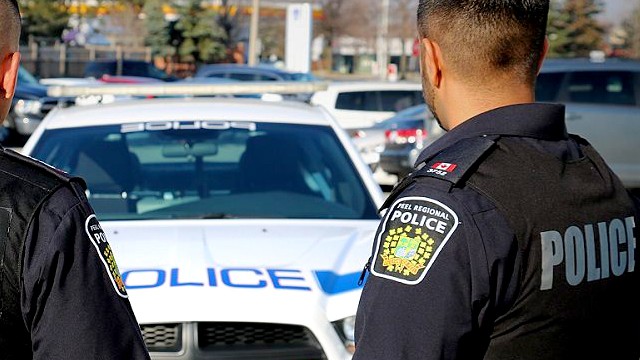Policing in Mississauga and Peel Has Come Under Intense Scrutiny
Published May 3, 2016 at 2:52 pm

Policing in Peel has come under intense scrutiny recently, with the practice of carding becoming the subject of appropriately heated debate — a practice Mississauga mayor Bonnie Crombie is absolutely not in favor of.
The Toronto Star has a helpful breakdown of the upheaval Peel policing has endured here.
Basically, the year began with the civilian board that oversees the force electing a new chair, Amrik Ahluwalia. Ahluwalia promptly tore into a report that Chief Jennifer Evans commissioned that supported the controversial practice of carding. Last month, the board fired its executive director. Now, The Star reports that community leaders are hoping that Ahluwalia can deliver on his promise to “make the Peel police force a model for the world.”
Peel magistrates Crombie and Brampton mayor Linda Jeffrey both sit on the board and are, it seems, progressive when it comes to policing — and for good reason. As The Star points out, Peel police have come under fire for multiple cases of officer misconduct, racism allegations and credibility issues over the years and it was high time to shakeup the organization. As for carding, Crombie called for a suspension of the practice last June.
“I was proud to join members of the Peel Police Services Board, including Brampton Mayor Linda Jeffrey; Amrik Singh Ahluwalia; and Norma Nicholson; to successfully pass a resolution recommending the suspension of street checks,” Crombie said in a City of Mississauga press release that was distributed after a September board meeting.
“When I first called for the review of street checks, in June, I did so because I believed it was important that we have all the facts to undertake a thorough review and analysis of this practice, and to have a better understanding of its scope and scale. Following the release of recent data, and the ongoing feedback I have received from the public, I believe there are serious issues about street checks that need to be addressed.”
Now, much to Crombie’s delight, the province has moved to strictly regulate the controversial checks that, Star data suggests, disproportionally target racial minorities.
According to The Star, community activists think more change is necessary to fix what’s broken in Peel police culture. Sophia Brown Ramsay, programming director for the Black Community Action Network of Peel, told the newspaper that she “wants the force to be more reflective of the people it polices in two of Canada’s most diverse cities.” She also told The Star, “there has been a trust issue between the police and the community for quite some time. That’s not good for policing, and it’s not good for the community.”
As for Mississauga, Crombie — along with Brampton’s Jeffrey — is looking for a more representative police board.
“We need to continue with our efforts to ensure the composition of the police services matches the diversity of the Peel population,” Crombie said, as reported by The Star. The newspaper also reports that Crombie added that she would like to see a focus on technology that would help modernize policing and reduce costs. She also called for more provincial accountability for police boards, adding that the province should do more to ensure members are qualified.
While conversations about police culture are fraught with warring emotions and battling ideologies, they’re essential — especially in the wake of the growth of the Black Lives Matter movement and several high-profile incidents of violent clashes between citizens and police throughout North America. Carding — openly supported by former mayor Hazel McCallion — has been controversial for its racial implications for too long and although some might proffer anecdotes about its effectiveness in solving crimes, there’s little doubt that it has bred acrimony between law enforcement and civilians. The distrust that Brown Ramsay mentioned to The Star is toxic and impedes crime fighting and it’s refreshing to see a shakeup at the board supported by progressive members who want to better connect the police to their communities.
A better relationship between law enforcement and citizens — a more open, transparent and trusting one — will probably do more to solve and prevent crime than a heavy-handed old-guard approach that relies on authoritarianism and statistically unsupported “best practices” that are known to sour relationships between police and minority community members.
It’ll be interesting to see what — if any — affect the board changes will have on policing in Peel and if community members and police will benefit from it.
INsauga's Editorial Standards and Policies


